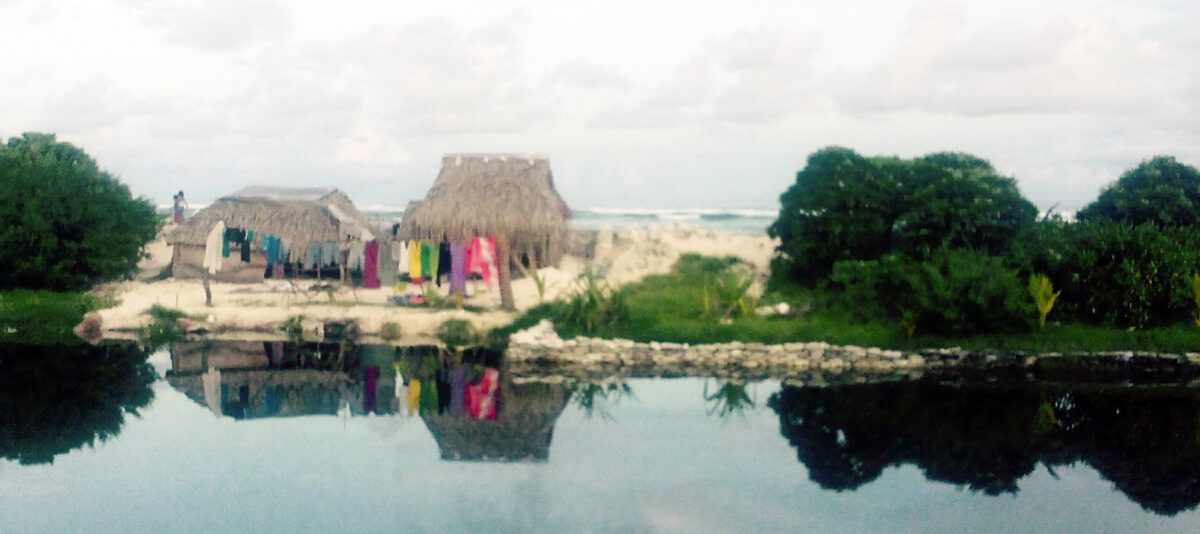by Caroline Anitha Devadason, MPH
The idyllic Micronesian island of Kiribati, next door to French Polynesia and boasting one of the largest marine sanctuaries in the world, is a tropical paradise. It’s hard to believe that its people are expected to become some of the world’s first climate change refugees.
When we think of population displacement, we often think of people fleeing war zones and conflicts. But climate change also displaces people. In fact, many island populations fear not only the loss of their homeland, but also the loss of their culture and identity, livelihoods and potentially their rights.
They are not protected by the 1951 UN Refugee Convention and 1967 Protocol, and will receive none of the legal protections granted to refugees. According to the UN, refugee status is conferred following persecution or violence; it does not extend to those displaced by climate stress or crises. This dilemma leaves the residents of Pacific Island nations such as Kiribati without any legal protections or recourse and facing health implications including food insecurity, mental health challenges, heightened risk of infection, vector-borne and waterborne diseases, malnutrition, increased risk of injury and trauma from extreme weather events, and an increasing risk of death for vulnerable populations including the elderly, young children and the disabled, among others [1]. They will also confront challenges regarding the right to work and access to health services in the countries they eventually immigrate to.
It is becoming urgent that climate change refugee status becomes internationally recognized under the UN Refugee Convention. Island populations have contributed the least to global climate change but will bear the brunt of its detrimental effects. Host countries need to accept these populations and prepare for population migration due to forced climate displacement.
Efforts have been made to address climate change and disaster-induced displacement such as the Nansen Initiative, a state-led, consultative process that seeks to identify effective efforts and address the protection of displaced peoples. In 2015, 109 countries endorsed the Nansen Initiative affirming to better support populations displaced by climate-induced disasters.
Preparation for—and dialogue surrounding—displacement can ensure successful relocation results for both the host country and displaced population. The Tuvalans, relocated from the atoll of Vaitupu to Kioa Island in Fiji, show what success could look like. They chose to move—and having that choice helped ensure a successful relocation.
However, it should be a responsibility of all nations—and a wake-up call to all governments—to put forward an agenda to address climate change mitigation and its impacts on health. While efforts are underway, they may not occur in time to remedy or offset these effects for Pacific peoples. And their plight translates to other small island developing states such as the Maldives in the Indian Ocean.
Climate change will also affect people in coastal areas in the future, from Florida and the Gulf of Mexico to Bangladesh and the Netherlands. Urban planning is necessary for the influx of displaced people due to climate change into cities such as Dhaka, Bangladesh. There are important health ramifications to this as well. Primary care providers are ill-prepared to address the implications of climate change on migrants and their needs. These not only include poor air quality and ineffective cooling impacting respiratory conditions or cardiovascular disease, waterborne illnesses and mental health impacts, but also legal ramifications for displaced populations.
Will steps be taken in time? All nations need to act now, with a concerted effort to offset the impacts of climate change. The recognition of climate change refugees is needed before the way of life of island residents sinks beneath the waves forever.
[1] World Health Organization Regional Office for the Western Pacific. (2015). Human health and climate change in Pacific Island countries. Retrieved June 2, 2022, from https://apps.who.int/iris/rest/bitstreams/1147666/retrieve


